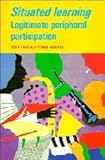
- 作者: Jean Lave,Etienne Wenger
- 出版社/メーカー: Cambridge University Press
- 発売日: 1991/09/27
- メディア: ペーパーバック
- クリック: 2回
- この商品を含むブログ (5件) を見る
学習とは共同体への参加の過程であり、その場合の参加とは、初めは正統的で周辺的なものだが、次第に関わりを深め、複雑さを増してくる。参与を通して学ぶ知識と技能の習得実践を、situated learning状況的学習という。
「まわりから徐々にでいい」という安心と、「ただし、あなたもちゃんとしたlegitimate参加者だぞ」という本気。仲良くもしない、ケンカもしない。認めて成長する。いいモデルだと思う。
───────────────────────────────────
・状況に埋め込まれた学習
・正統的周辺参加=お客ではない、でも周りから入っていくことが大切
はじめの段階は、正統的周辺参加(Legitimate Peripheral Participation, LPP)
深度を深めて、十全参加(full participation)
・獲得された能力に応じて自分の役割が変化する
───────────────────────────────────
Legitimate peripheral participation (LPP) is a theoretical description of how newcomers become experienced members and eventually old timers of a community of practice or collaborative project (Lave & Wenger 1991). According to LPP, newcomers become members of a community initially by participating in simple and low-risk tasks that are nonetheless productive and necessary and further the goals of the community. Through peripheral activities, novices become acquainted with the tasks, vocabulary, and organizing principles of the community.
Gradually, as newcomers become old timers, their participation takes forms that are more and more central to the functioning of the community. LPP suggests that membership in a community of practice is mediated by the possible forms of participation to which newcomers have access, both physically and socially. If newcomers can directly observe the practices of experts, they understand the broader context into which their own efforts fit. Conversely LPP suggests that newcomers who are separated from the experts have limited access to their tools and community and therefore have limited growth.
LPP is not reserved for descriptions of membership in formal organizations or professions whose practices are highly defined. For example, O’Donovan and Kirk (Kimble & Hildreth 2008) suggest that young people’s participation in sport can be compared to a Community of Practice related to physical education.

コメント